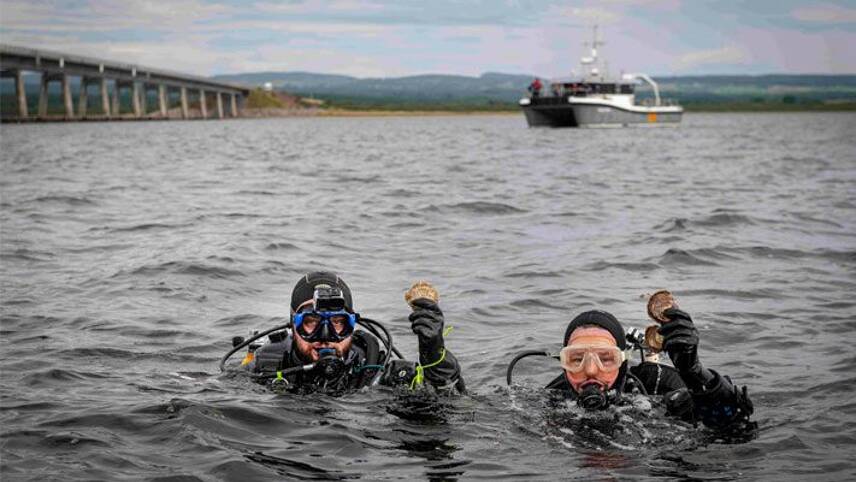Register for free and continue reading
Join our growing army of changemakers and get unlimited access to our premium content

Pictured: Alex Robertson-Jones and Professor Bill Sanderson
The milestone was posted by the single malt Scotch whiskey brand earlier this week, seven years after the restoration scheme began in 2014.
Glenmorangie has been working with scientists at Heriot-Watt University to deliver the so-called Dornoch Environmental Enhancement Project or DEEP project. The third phase of the project has involved 20,000 native European oysters being supported back into the reef, after they went extinct in the region more than a century ago. In time, the project is striving to create a reef of four million oysters.
“This [third] phase’s success will pave the way for the restoration of the reef, after years of research, planning and monitoring,” Glenmorangie said in a statement.
Phase one of the project involved assessing archaeological records, ancient literature and fisheries records to chart the history of oysters in the Firth and assessing how reintroduction could be made feasible. Phase two involved taking 300 oysters from Loch Ryan and embedding them on two sites in the Dornoch Firth to confirm that they would survive and grow.
Glenmorangie originally began working on the project, providing seed funding, in consideration of the impact of its organic waste discharge from its distillery in Train. Glenmorangie has installed an anaerobic digestion (AD) plant at the distillery to process its organic waste, which has reduced its biological impact on the Dornoch Firth by 95%. With one oyster capable of purifying up to 200 litres of water a day, it is hoped that the reef will account for the remaining 5% by 2030.
The Heriot-Watt team is now working to quantify the climate benefit of the project, as well. There is evidence that restored reef habitats have the ability to act as long-term carbon stores and an increasing belief that the same could be said of oysters, in their shells.
“DEEP has allowed us to demonstrate the many benefits of restoration of long-lost reefs, and carbon storage is yet another exciting outcome of the research for the project,” Heriot-Watt’s associate professor of marine biodiversity Bill Sanderson said.
“We are still uncovering exactly how much of a game-changer this can be but we’re increasingly focusing our research on delving deeper into the role of the oyster reef as a carbon store. It’s great to think that the Dornoch Firth can contribute as a global exemplar for helping to mitigate climate change, especially as we run-up to COP26 being held here in Scotland.”
The Marine Conservation Society is supporting Glenmorangie and Heriot-Watt with the DEEP project. An independent research advisory panel of scientists from the International Union for Conservation of Nature (ICUN), the Marine Biological Association UK and the Native oyster Restoration Alliance has also been appointed to the project. Additionally, a string of oyster growing hubs have been in contact with the project, with the hopes of these facilities delivering further restoration projects themselves and growing the oysters needed for similar schemes across Europe.
The bigger picture
Other nature restoration schemes currently taking place across the UK’s marine habitats include seagrass restoration projects spearheaded by WWF, in partnership with Carlsberg and Sky; and a kelp forest off the coast of Sussex, led by local councils.
Earlier this year, the Office for National Statistics (ONS) revealed the results of its assessment of the value of the UK’s marine assets, including renewable energy production, tourism attraction, sustainable fishing and carbon sequestration. The figure was placed at £211bn. In the wake of the Dasgupta Review, which outlined how governments can properly factor the true value of nature into decision-making, Ministers are being pressed to ensure that marine conservation and restoration is adequately prioritised ahead of COP26.
Join the conversation at edie’s COP26 Inspiration Sessions
On Thursday 9 September, edie will be hosting three back-to-back online events focused on how businesses can harness nature-based solutions while adapting to the changing climate to improve resiliency.
Hosted during edie’s special COP26 Focus Week of content and events, this online event offers up an afternoon of live, interactive webinar presentations and discussions – all dedicated to driving business action around these two critical themes of the upcoming climate talks.
Click here for a full line-up of sponsors and speakers, and to register. Grosvenor, EY, the Woodland Trust have been announced as sponsors, alongside headline Festival sponsor Virgin Media O2. Additional speakers will be announced in the coming weeks.
Sarah George


Please login or Register to leave a comment.